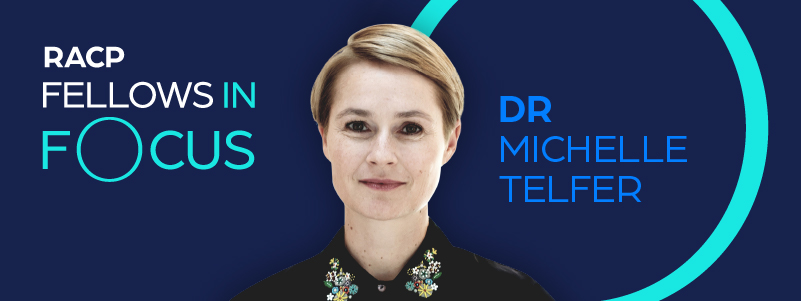RACP Fellows in Focus: Dr Michelle Telfer
Date published:
04 Mar 2022

Before studying medicine at the University of Western Australia, Dr Michelle Telfer was a gymnast with the Western Australian Institute of Sport. As a 16-year-old she won silver and bronze medals at the 1990 Commonwealth Games in Auckland and was a member of the 1992 Olympic Gymnastics Team in Barcelona.
Michelle currently works as a Paediatrician and the Head of the Department of Adolescent Medicine at The Royal Children’s Hospital (RCH) Melbourne. She is also the Director of the RCH Gender Service, being instrumental in the expansion of the service with rising demand for trans-medicine in children and adolescents. In 2015, The RCH Gender Service was awarded the Minister for Mental Health’s Award for excellence in consumer leadership and advocacy at the Victorian Public Healthcare Awards.
When we spoke with Michelle , we were curious to understand why someone of her immense talents would choose to go down the paediatrics pathway. She explained,
“When I first started working in paediatrics, I enjoyed interacting with the children and the complexity of working with a family. Unlike adult medicine, where the interaction is with a patient and some involvement of the family, in paediatrics, almost every interaction is within a family context. I find paediatrics interesting in the context of a family dynamic and working out, not just where a problem might be, but also working around the different people within the family to help improve the situation.”
A transition from an Olympic athlete to medicine is - arguably - not the most natural career pathway. There are lots of important skills required to be a good paediatrician, so we asked Michelle what she felt were the most valuable skills she brought with her when side-stepping into a medical career,
“Communication is paramount to engage the child, but also to communicate with parents, siblings and others involved in the care of that young person. It doesn't matter if you've got the perfect medical plan, practitioner or medications. Communication is key.”
“If you're not engaged in the process, they're actually not going to get better or engage in some kind of psychological therapeutic process. It’s about being interested in them as people, as much as being interested in the medical problems that might come and willingness to listen to what the young person needs rather than telling people what they should do.”
In recent years, Michelle’s work in supporting trans children and young people has brought about important changes in Australia. She notes,
“Affirming young trans people and supporting them has bought me lots of opportunities to learn about myself, my resilience and my ability to work as a doctor and not necessarily be considered in a positive way.”
“My involvement in changing the law has been my biggest career success. After five years of advocacy, talking to politicians and talking to the human rights commission, helping them understand the issues facing young people and to have it all come together in a courtroom, I felt very proud. Whilst there are still so many things that we need to do to improve trans rights, that was a very big step forward.”
When asked about where she’d like to go from here, Michelle answered tentatively,
“That’s really interesting. I don't have a long-term plan. I never have. I like to keep my eyes and ears open for various opportunities and just make the most of them. If someone had told me when I started paediatrics, that I would end up as the expert in trans young people and their care, I wouldn’t have believed them! I would like to continue to be open to opportunities in the future, wherever they may take me. I certainly don't have a roadmap for what could be another 20 years of my career.”